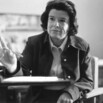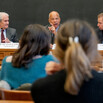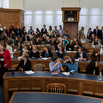Ethics Bureau Instrumental in SCOTUS Reversal of Capital Murder Case

After a long legal fight, the U.S. Supreme Court summarily vacated a constitutional decision by the Louisiana Supreme Court, handing former death row inmate Roger Lacaze a major victory in his quest for a new trial.
The High Court’s decision, which remands the case back to Louisiana, was made based on arguments students put forth through the Ethics Bureau clinic at Yale Law School, which submitted an amicus brief back in April 2017.
Lacaze was convicted of capital murder in a high-profile New Orleans case involving the murder of a police officer that occurred in 1995.
After the Louisiana Supreme Court denied him relief, the Ethics Bureau, led by Visiting Lecturer in Law Lawrence Fox and students Heather Richard ’18, Erin Biel ’18, and Jamie Durling ’18, filed a cert-stage amicus brief before the U.S. Supreme Court.
The ruling, siding with the merits of the Bureau’s amicus brief, asserts that the state Supreme Court in Louisiana failed to properly review one of the central arguments in Lacaze’s defense. Lawyers for Lacaze had argued that the Court should have taken into account that the retired criminal district court judge, who presided over the case, never revealed that he was central to the police investigation and was, in effect, a witness in a police investigation regarding the source of the murder weapon.
In their brief, they urged the Court to grant summary relief because the Louisiana Supreme Court applied the wrong standard for judicial bias. With the U.S. Supreme Court’s ruling this week, they vindicated the Bureau’s argument, granting and vacating the decision on that very basis.
"As an individual who has spent over 20 years in solitary confinement on death row, Rogers is among the most disenfranchised and forgotten in our country,” said Amir Ali, an attorney at the MacArthur Justice Center, which represents Rogers Lacaze. "He will forever be grateful to Yale Law and the Bureau for its support.”
Durling said it had been a privilege working on Mr. Lacaze’s case, and noted that the Clinic plans to stay involved when the case returns to the Louisiana Supreme Court.
"Judicial impartiality is one of the bedrock principles of a fair trial,” said Durling. “Courts safeguard that principle by evaluating claims of judicial bias according to an objective rather than subjective standard. We were incredibly pleased to see the Supreme Court reaffirm the importance of an objective standard in Mr. Lacaze’s case.”
The Ethics Bureau advises lawyers on how to proceed when faced with violations of the Model Rules of Professional Conduct and other ethical dilemmas. Students draft amicus briefs in cases involving professional responsibility; help people with ineffective assistance of counsel claims; and offer ethics advice to nonprofit organizations. A weekly class on professional responsibility is also part of the bureau.


